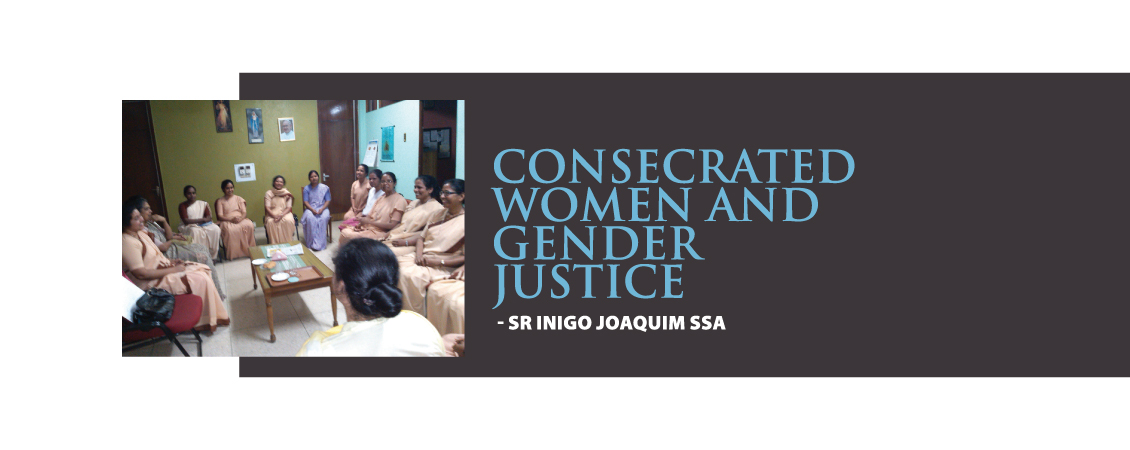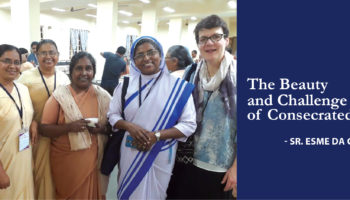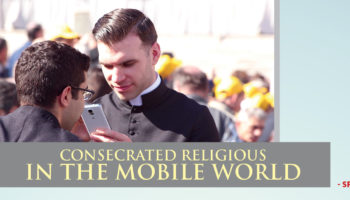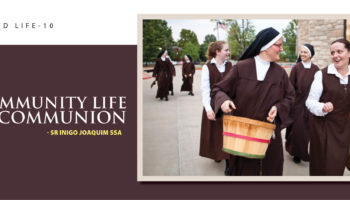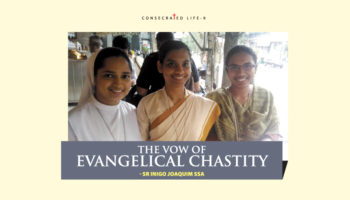Positive Experiences
The following are my few positive experiences when I took a legitimate pride on being a woman religious.
I was at the Synod in Rome on “Conecrated Life” in 1994. Many women had been invited. When I was sitting in the Synod Hall as an equal member with Cardinals and Bishops, I felt that I belonged to a Church in which women and men are equal. The Bishops listened to us women and appreciated and accepted us. In one of the interventions, a Bishop said: “In the Church, 75% of the consecrated people are women. If there are no women, there is no Consecrated life and no Church. Hence, the future of the Church depends upon the response we would be giving to women religious. If they don’t feel our support, eventually the Church will lose women too in this century.”
In 2000, I was one of the three resource persons at Bangalore (the only woman) in “Yesu Christu Jayanthi”. At the CBCI meeting in Jamshedpur in 2008 on “Women empowerment”, once again I was the only woman religious along with four other women. I felt listened to and a valued member of the Church.
Official Documents
When I read some of the encyclicals and other documents of the Popes, I see that they are very much in favour of gender sensitivity and the dignity of women. At the time of the Beijing Conference, St. John Paul II wrote: “Women have often been relegated to the margins of society and even reduced to servitude. This has prevented women from truly being themselves and it has resulted in a spiritual impoverishment of humanity”. In all humility he apologised to the women for the wrongs done to them and urged the church to make amends for these sins. The Bishops at the Asian Synod were most concerned that “the Church should be a participatory church in which no one feels excluded”, acknowledging that “the contribution of women have often been undervalued or ignored” (EA: 34).
In the life of Jesus, there is no indication that Jesus wanted women to be subject to the patriarchal norms of his time. On the contrary, women held a high position in the ‘Jesus Movement’. In Paul’s mission, Priscilla’s contribution to the church as a teacher of theology, a leader, missionary and an active ministerial teammate of Acquila, raises the question as to why we have so few 21st century ‘Priscillas’. Could this be because there is a severe dearth of ‘21st century Acquilas’?
Why is the situation not different today in the church? Even after 2000 years of their existence, half of the followers of Jesus are not counted. They are neither visible nor audible in the Church. In India women constitute nearly 82% of the religious. The Synod of Bishops on “Consecrated Life” recommended very strongly that competent women religious must be given responsible tasks in the Church and that they should be included in the process of planning and decision making at all levels.
The Role of Women
Of course, there has been an increase in awareness among both men and women today. Women religious have realized that their empowerment is needed for mission. There is a lot of eagerness among women religious to study the scriptures, theology, psychology, sociology and spirituality in a contextual way. Some religious women are teaching in the seminaries and facilitate chapters and conduct retreats too. Priests invite women religious and the laity to speak to them on various topics. Some of them allow sisters to break the Word of God during special Eucharistic celebrations.
But still there is a long way to go. Where women are not empowered, men are also not empowered. Where women are not free, men are also not free. A bird cannot fly with one wing. We need each other to be fully human. A woman’s experience of God is unique. Her approach to reading and interpreting the Word of God will naturally make a difference, for she reads and interprets it from a perspective that expresses her feminine ethos. Her absence in the pulpit is an important missing link in the ministry of Proclamation.
We women are also responsible for our own empowerment. We have to get in touch with our patriarchal blocks. We should refuse to be the silenced half in the Church. Without arrogance, we need to assert our God-given abilities and gifts. We should have confidence in our own abilities and we should come forward to accept responsibilities both in the Church and in society. Our formation should undergo a paradigm shift to give us a healthy feminist consciousness. We should be made to think, dream and critique aloud.
The call of Jesus, “Little girl, get up” (Mk 5:41), is a clarion call for women’s freedom in the Church and in society. Ultimately, it is the women who must determine what a woman’s worth is. What is needed today is not a competitive spirit and prejudiced people. We do not have to prove who is right and who is wrong. But men and women together can collaborate and work out the means to realize a new heaven and new earth.
Questions for Reflection & Sharing:
- What are the positive experiences of being a woman in our culture?
- … and in the Church?
- What are the negative aspects of our culture in its understanding and treatment of women?
- How does the Church need to change in its understanding and treatment of women?
- How can women religious and lay women promote their own development?
- What can, and should, men do in this process?
- Are you convinced that a society and a church that treat men and women as equals are more in accordance with God’s will? Give your reasons.
- Are you convinced that such a society is better for everyone—women and men? Give reasons for your answer.
– Sr. Inigo SSA was Superior General of her congregation for two terms, and also secretary of the Women’s Section of National CRI. She represented the religious of South Asia at the Synod of Bishops on Religious Life, and is a sought-after resource person for Chapters and seminars. She spent years ministering to prisoner in Tihar Jail, Delhi.
To subscribe to the magazine Contact Us
